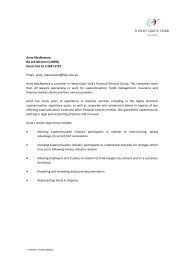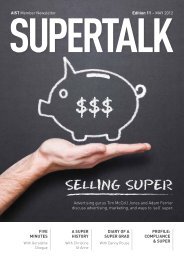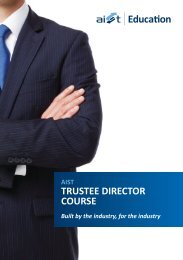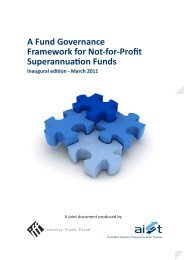Download 2010 Annual Report with Finance Report - Australian ...
Download 2010 Annual Report with Finance Report - Australian ...
Download 2010 Annual Report with Finance Report - Australian ...
Create successful ePaper yourself
Turn your PDF publications into a flip-book with our unique Google optimized e-Paper software.
CEO’s REPORT<br />
and unsettling recommendation that the SG remain at<br />
its current level of 9 per cent.<br />
Fortunately, the industry didn’t have to wait long for the<br />
Government to reject the argument. On May 2nd - the<br />
same day that the final Henry recommendations were<br />
aired - the Government unveiled its landmark super reform<br />
package, the central plank of which was a seven-year<br />
timetable to lift the SG to 12 per cent by 2019, along<br />
<strong>with</strong> a rebate for low income earners.<br />
AIST, along <strong>with</strong> just about everybody else in the super<br />
industry, was elated. But we also knew that <strong>with</strong> a looming<br />
Federal Election, 12 per cent was far from guaranteed.<br />
Indeed, <strong>with</strong> the cashed-up mining industry fiercely<br />
opposed to the Government’s proposed Resource Super<br />
Profits Tax, the super industry had a mighty challenge on<br />
its hands.<br />
Fiona Reynolds, CEO (FAIST)<br />
The past year has seen AIST intensely involved in<br />
helping shape the Government’s reform agenda.<br />
Not since the introduction of compulsory super<br />
have those working in superannuation had to<br />
contemplate so many potential changes to the<br />
super landscape.<br />
TOWARDS 12 PER CENT<br />
Of course the biggest change of all – and one that was<br />
most welcome – concerned the Government’s proposal<br />
to lift the Superannuation Guarantee to 12 per cent. While<br />
this announcement in May came as a surprise to many,<br />
AIST had already begun the year <strong>with</strong> a strident call for<br />
12 per cent following the release of the Intergenerational<br />
<strong>Report</strong>. This report highlighted the escalating costs of<br />
Australia’s ageing population and contained the worrying<br />
forecast that, even by 2050, most retirees would still be<br />
heavily reliant on the age pension.<br />
Not surprisingly, few <strong>Australian</strong> workers were happy <strong>with</strong><br />
this prospect. Public opinion polls conducted by AIST<br />
suggested that not only were an overwhelming majority<br />
of <strong>Australian</strong>s in favour of lifting the SG to 12 per cent but<br />
most were prepared to pay for this rise out of their wages.<br />
But not everyone was convinced that 12 was a good<br />
number. When the Henry Tax Review’s long-awaited<br />
report was finally released, it included the controversial<br />
AIST immediately sprang into action <strong>with</strong> a public<br />
campaign. We called for bipartisan political support for<br />
12 per cent, and we requested that the Coalition release<br />
its super policy. We called on Tony Abbott to explain<br />
how his party planned to tackle the nation’s retirement<br />
funding challenge.<br />
AIST was equally vocal in explaining to employer groups,<br />
who claimed that 12 per cent would damage business<br />
and cause an economic downturn, that they had nothing<br />
to fear. We cited data that showed wages and profits<br />
had actually flourished during previous years of rising<br />
compulsory super contributions. The sky hadn’t fallen in.<br />
Similarly, when the Minerals Council of Australia released a<br />
spate of advertisements claiming that worker’s super was<br />
at risk, AIST pulled no punches. We accused the miners<br />
of misleading consumers and called on the <strong>Australian</strong><br />
Securities and Investments Commission to investigate.<br />
One week later, during her maiden speech as the new<br />
leader of the Labor Party, Julia Gillard called on the miners<br />
to drop the offending advertisements.<br />
Another win for AIST during the year was our success<br />
in persuading the Government to re-think its proposed<br />
reduction of the concessional caps for older workers.<br />
As one of several measures to improve the equity and<br />
fairness of our super system, the Government adopted<br />
AIST’s recommendation to the Henry Review to retain<br />
the concessional cap limit of $50,000 for older workers<br />
<strong>with</strong> retirement balances of less than $500,000. AIST<br />
has long-argued that older workers who missed out on a<br />
working lifetime of compulsory super and whose balances<br />
remained low should be encouraged to top up their super.<br />
12










